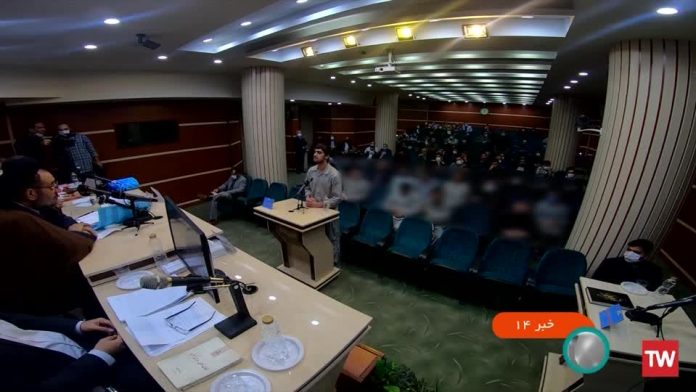
By Ahmad Rafat
The violation of human rights in the Islamic Republic of Iran has become the focus of intense international attention in the past few weeks.
On Dec.10, coinciding with World Human Rights Day in Oslo, Narges Mohammadi — an Iranian human rights advocate and a political detainee in Iran — received the 2023 Nobel Peace Prize.
Two days later,at the European Parliament headquarters in Strasbourg, Mahsa Jina Amini and the ‘Women, Life, Freedom’ movement were acknowledged with the Sakharov Prize.
On Dec. 14, coinciding with the UN Global Refugee Forum in Geneva, a group of women from the Iranian diaspora, accompanied by three victims of Islamic Republic human rights abuses, held a media briefing exposing the atrocities committed by the regime in Iran. The conference was managed by Nazanin Afshin-Jam (an international child rights activist), while other speakers at the conference included: Maryam Banihashmi (human rights activist), Elika Eftekhari (lawyer), Sara Seyed (actress and human rights activist), and Azadeh Afsahi (Psychotherapist).
Also participating in the media briefing were three victims of repression in the Islamic Republic: Zaniar Tondru (a young Kurdish man who lost his sight due to gunfire during last year’s protests), Abbas Dehghan (a former prisoner of conscience tortured in the prisons of the Islamic Republic for five years), and Pouria Ebrahimi (a civil activist and former political prisoner), also participated in this media meeting.
Islamic Republic Executes Former Child Bride, According To Her Ex-Cellmate
President Ebrahim Raisi was set to lead the Islamic Republic’s delegation at the UN Global Refugee Forum in Geneva, but he abruptly canceled his trip at the last minute. The reason behind Raisi’s decision was a complaint lodged against the Iranian president by three Iranian citizens residing in Switzerland. . Raisi faces charges of crimes against humanity for his involvement in mass executions in 1988.
The Swiss news agency Keystone–SDA reported that the three Iranians had urged the Swiss Federal Prosecutor to apprehend Raisi on charges of “genocide, torture, extrajudicial executions, and other crimes against humanity” for subsequent arrest and interrogation.
Ever since Sweden’s sentencing to life imprisonment of Hamid Nouri – Raisi’s aide during the 1988 mass executions at Gohardasht Prison — the possibility of legal action against Raisi arises if he travels to Switzerland.
During the Geneva press conference, Afshin Jam cautioned officials from Western countries to “think before shaking hands with those whose hands are stained with the [blood of] the Iranian people.”
She added: “The Islamic Republic of Iran is the leading state sponsor of terror, funding proxy terrorist groups to instigate wars and instability, causing an exodus of migrants in neighboring countries, including here in Europe. And this regime dares attend the Global Refugee Forum? Some of our world leaders dare to shake their hands, engage in hostage diplomacy, and create a precedent for the cycle to continue where the regime detains innocent foreign nationals to be used as pawns. The delegation of Iran should not be welcomed here.”
Maryam Banihashemi, a human rights activist, said : “I’m certain that were we, Iranian exiles, and you as broadcasters of our voice, not there to channel the cries of the Iranian people, the Butcher of Tehran, President Raisi would be here in Geneva right now at the Forum – to abuse the UN’s institutions, and to spread the regime’s propaganda, as he did just three months ago at the UN General Assembly in New York.”
Tondru, the Kurdish living witness to the atrocities of the Islamic Republic, explained during the press conference that he still has eight bullets in his body. His remarks highlighted the irony in the fact that those who shot him — and who killed his 16-year-old friend Zakaria Khyal as well as Gina Amin — are now freely traveling abroad and being welcomed by Western countries.
Abbas Dehghan, who endured five years of imprisonment and numerous instances of torture, addressed the press briefing, shedding light on the severe violations by the Islamic Republic of the rights of religious minorities and ethnic groups.”Today, the Islamic Republic is actively pursuing the physical elimination of its opponents, both domestically and internationally,” he said.
Pouria Ebrahimi, who spent 12 years in the Islamic Republic’s prisons, made a plea to Western governments. “Cease appeasement and align yourselves with the right side of history; Ali Khamenei’s dictatorship is destined to fail,” he said. Two days before the Geneva press conference, on Dec. 12, another dark chapter unfolded in the history of the Islamic Republic’s repression: this time at the European Parliament headquarters in Strasbourg. On this day, the parents and brother of Mahsa Jina Amini were expected to receive the Sakharov Prize posthumously awarded to her. Mahsa Jina Amini was arrested by Iranian agents on Sep. 13, 2022, in Tehran for showing a few strands of hair visible under her headscarf. Three days later, on Sep. 16, she died of head injuries. Mahsa Jina’s murder became the catalyst for the ‘Woman, Life, Freedom’ movement.
On Dec. 12, Mahsa’s mother Mozhgan Eftekhari, her husband Amjad, and her son Sasan were all absent from Strasbourg. Four days earlier, the Islamic Republic of Iran barred them from travel to France at Tehran International Airport and confiscated their passports. Their lawyer, Mohammad Saleh Nikbakht, attended the ceremony on their behalf, reading a message from Mahsa’s mother to the members of the European Parliament. While still in Strasbourg, Nikbakht received a one-year prison sentence from a Tehran court on charges of “propaganda activities against the regime.”
Two more victims of repression in the Islamic Republic received the Sakharov Award from the head of the European Parliament, Roberta Metsola: Afsun Najafi, sister of Hadith Najafi, who was shot dead during last year’s protests, and Mersedeh Shahinkar, who lost an eye to a bullet fired during the same protests.
Shahinkar said: “Examine my eyes, look at the graves of our deceased, observe the restrictions on Jina’s family preventing them from leaving – the Islamic Republic wishes us, opponents, protesters, petitioners, and bereaved, to become its slaves. Nevertheless, we will persist in seeking justice and liberation.”
Najafi, in his speech referencing the plight of the protesters, said: , “I prefer not to dwell on the unjust events involving my sister, my family, and the thousands of others who lost their lives. Instead, I want to take this extraordinary opportunity you have afforded me to address the ongoing and constant suffering of Iran’s young fighters.”
“I stand here, like thousands of other protesting families, telling you that the future belongs to the free nation of Iran,” she added.
Conveying the message from Mahsa Jina in the European Parliament, Nikbakht said:: “We gather here to pay tribute to Jina’s memory in Joan of Arc’s hometown, appreciating the beauty and significance of these women coming together – inspiring history across centuries. They have crossed borders with their deaths, reviving the spirit of liberation and the people’s quest for freedom. Jina embodies womanhood and life, her name symbolizes liberation, spreading the dream of freedom from her birthplace, Kurdistan, to Iran, the Middle East, and globally, mobilizing millions of oppressed women and men, nurturing hopes of soaring on the boundless horizon of salvation.”
Two days before the ceremony in Strasbourg, Mohammadi received the Nobel Peace Prize, in absentia, in Oslo. She remained confined to a cell in Tehran’s Evin prison while her twin children, Kiana and Ali, accepted the prestigious award on her behalf. During the ceremony, Kiana and Ali presented their mother’s message before the king, queen, and crown prince of Norway, earning applause from the Norwegian royal family.
Mohammadi’s message at the Nobel Prize ceremony highlighted crucial points and portrayed the true face of the Islamic Republic. Like fellow Iranian human rights activists, she urged Western governments to stop appeasing the Islamic Republic.
“The reality is that governments and the United Nations have not demonstrated a genuine effort, practical coherence, or a progressive approach to support the victory that the Iranian people require and deserve,” said the Nobel Peace Prize winner.
She criticized Western governments’ policies and strategies as too superficial to ensure democracy and peace in the region and to genuinely validate the Iranian people’s will to achieve their goals. Mohammadi emphasized that Western governments must abandon aimless strategies supporting the continuity of Iran’s government and thereby delaying the progress of democracy, and human rights. She called on global civil society to provide more earnest support for the Iranian people’s efforts towards a democratic and non-violent transition, aiming for peace, democracy, and human rights.


